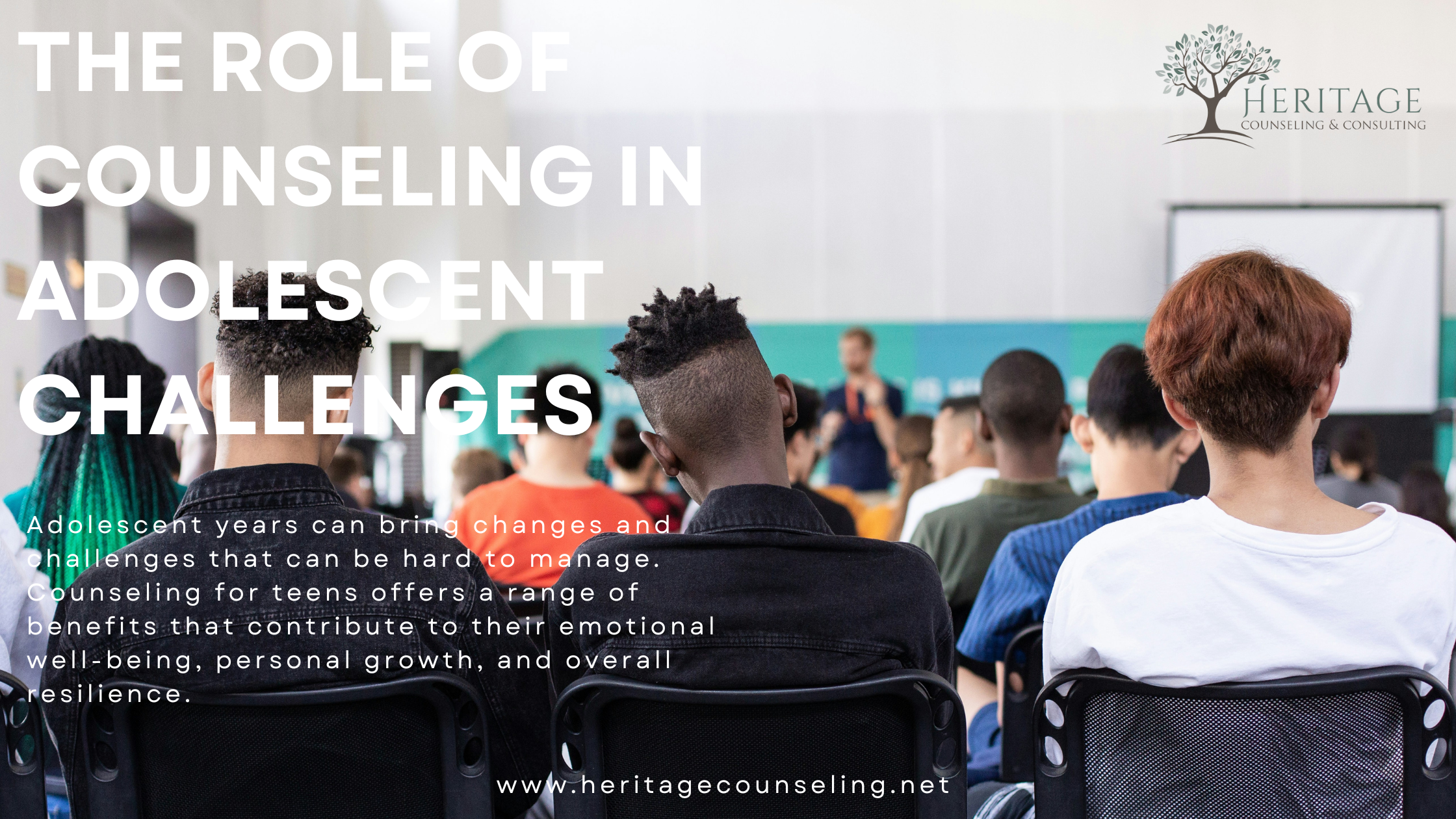Introduction
The teenage years, according to Erikson’s psychosocial development stage theory, are a time of experimentation and development of identity and roles. Yet they also bring challenges that can be overwhelming. This blog explores the importance of counseling for teens facing difficult times, offering insights into the benefits and signs that indicate when professional support is crucial.
The Importance of Support During Teen Challenges
The journey through adolescence is marked by a myriad of challenges, each unique and impactful in shaping a teen's emotional landscape. During these critical years, teens grapple with a range of issues that can sometimes be very difficult to manage on their own. In the face of such challenges, the importance of a robust support system cannot be overstated. Common challenges that teens face can include:
Home conflicts:
Witnessing the conflicts of parents and other family members can be emotionally tumultuous for teens. Counseling provides a safe space to express feelings, process emotions, and develop coping mechanisms.
Choosing the A College:
The pressure of deciding on a college can be daunting. Counseling offers guidance in navigating this decision, addressing anxieties, and exploring options aligned with the teen's aspirations.
Social Relationship Challenges:
When friendships end or undergo strain, teens may feel isolated. Counseling aids in developing resilience, communication skills, and strategies for building healthy relationships.
Benefits of Counseling for Teens
Counseling for teens offers a range of benefits that contribute to their emotional well-being, personal growth, and overall resilience. Here's an expanded look at the advantages of counseling for teens:
- Emotional Regulation:
- Counseling helps teens understand and regulate their emotions. It provides a safe space to explore and express feelings, teaching them healthy ways to cope with and manage emotions such as anger, sadness, and anxiety.
- Enhanced Coping Skills:
- Adolescence can be a time of heightened stress. Counseling equips teens with practical coping strategies to navigate challenges effectively, fostering resilience and adaptability in the face of adversity.
- Improved Self-Esteem:
- Adolescence often brings self-esteem challenges. Counseling encourages teens to explore and appreciate their strengths, fostering a positive self-image and a sense of self-worth.
- Improve Communication Skills:
- Effective communication is vital for healthy relationships. Counseling teaches teens how to express themselves assertively, listen actively, and navigate conflicts constructively, enhancing their interpersonal skills.
- Improve Social and Relationship Skills:
- Teens may face challenges in friendships and romantic relationships. Counseling provides guidance on building and maintaining healthy connections, navigating social dynamics, and setting boundaries.
- Identity Exploration:
- Adolescence is a time of self-discovery. Counseling supports teens in exploring their identity, values, and aspirations, helping them develop a clearer sense of self and purpose.
- Enhance Academic performance:
- Emotional well-being is closely linked to academic performance. Counseling can address challenges related to school stress, test anxiety, and time management, contributing to improved focus and academic achievement.
- Mindfulness and Stress Reduction:
- Counseling often incorporates mindfulness techniques, helping teens stay present and manage stress more effectively. Mindfulness practices can enhance their ability to cope with academic pressures and personal challenges.
- Resilience Building:
- Adolescents face various life transitions. Counseling helps teens build resilience, teaching them how to bounce back from setbacks, adapt to change, and navigate the uncertainties of adolescence with greater strength.
- Prevention and Intervention:
- Counseling provides a proactive approach to mental health. It can address emerging issues before they escalate, offering early intervention and preventing long-term emotional struggles.
- Parent-Teen Communication:
- Counseling can include family sessions that improve communication between parents and teens. This fosters understanding, empathy, and a supportive family environment.
In summary, counseling for teens is a holistic and empowering intervention that addresses various aspects of their well-being. By providing a supportive and confidential space, counseling equips teens with the tools they need to navigate challenges, build resilience, and foster positive mental health throughout their formative years.
Signs Teens Should Consider Counseling
Behavioral Changes:
Sudden shifts in behavior, such as withdrawal, aggression, or academic decline, may indicate underlying emotional struggles.
Changes in Sleep Patterns:
Disruptions in sleep, whether excessive sleep or insomnia, can be signs of emotional distress.
Persistent Sadness or Anxiety:
Lingering feelings of sadness, anxiety, or hopelessness may warrant professional intervention.
Difficulty Concentrating:
Struggling to concentrate or a decline in academic performance might indicate emotional challenges.
Changes in Social Interactions:
Significant changes in relationships, such as avoiding friends or conflicts with peers, can be red flags for emotional distress.
Conclusion
Counseling is a valuable resource for teens navigating challenging times. By fostering emotional well-being, improving coping strategies, and providing a supportive environment, counseling plays a pivotal role in empowering teens to overcome difficulties and thrive during these formative years. If you notice signs that your teen may benefit from counseling, consider reaching out to Heritage Counseling at 214-363-2345 for more information.

